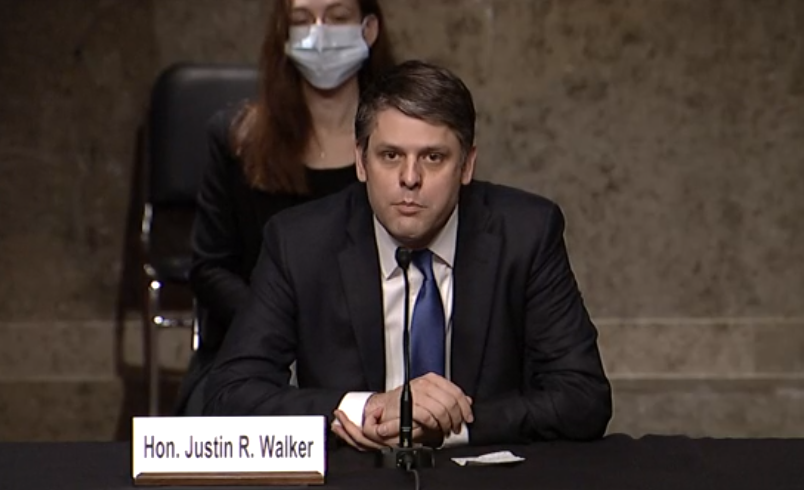Senate Judiciary Approves Walker for Seat on D.C. Circuit

The smarter way to stay on top of the multichannel video marketplace. Sign up below.
You are now subscribed
Your newsletter sign-up was successful
With more whimper than bang, the Senate Judiciary Committee voted Thursday (June 4) along party lines--Republicans 'yea,' Democrats, "nay"--to favorably report President Trump's nomination of Judge Justin Walker to fill a soon-to-be vacant seat on the U.S. Court of Appeals for the D.C. Circuit.
He is replacing Judge Thomas B. Griffith, who is retiring in September (the story initially said he was replacing Supreme Court Justice Brett Kavanaugh, but Kavanaugh's seat was already filled by Neomi Rao.
Walker, 37, is currently a judge on the U.S. District Court for the Western District of Kentucky, though with only about six month's experience in that post. Before that, he was a professor at the Brandeis School of Law (University of Louisville).
The committee's members had already made their views known in a contentious nomination hearing back in May, but a handful of Democrats briefly reprised their opposition, tied to Walker's opposition to the Affordable Care Act during a time of pandemic and their fear he could not separate his political opinions from his judicial ones.
Sen. Dick Durbin (D-Ill.) asked if anyone with a straight face could say that Walker, with limited judicial experience, was the best person for a lifetime appointment to the second highest court in the land--it is the court of first jurisdiction over government agency decisions, including the FCC, as well as something of a warming bench, as it were, for potential Supreme Court Justices, a number of whom, including Kavanaugh and current Chief Justice John Roberts, have been plucked from its ranks.
Durbin said the only reason Walker was nominated is that he was a friend of Senate Majority Leader Mitch McConnell (R-Ky.) and an outspoken critic of Obamacare.
Sen. Richard Blumenthal (D-Conn.), said Walker was another effort to remake the federal judiciary in the image of the extreme far right.
The smarter way to stay on top of the multichannel video marketplace. Sign up below.
Then a brief vote was held and Walker's nomination favorably reported to the Senate for a full vote.
Related: FCC Case Remand Could Weaken Defense of Decisions
Walker, who clerked for Kavanaugh on the D.C. circuit, said he was unabashed in his defense of Kavanaugh's view of the law, which meant the separation of powers, the limited role of judges and their fidelity to text. "It is my job to go where the law leads," he said, saying he was an "unabashed originalist."
Given that the D.C. Circuit often hears challenges to agency decisions--the fight over the FCC's net neutrality rules have gone several rounds in that court, his view of such reviews is important.
Walker told the committee back in May that in terms of judges reviewing agency actions, it is never the role of the judge to second-guess a political policy decision, especially when it comes from agency expertise. But he said it is always a judge's role to say what the law is, and when an agency has issued a regulation that is not supported by statute, to find that it is invalid, even if that regulation was great policy."
Contributing editor John Eggerton has been an editor and/or writer on media regulation, legislation and policy for over four decades, including covering the FCC, FTC, Congress, the major media trade associations, and the federal courts. In addition to Multichannel News and Broadcasting + Cable, his work has appeared in Radio World, TV Technology, TV Fax, This Week in Consumer Electronics, Variety and the Encyclopedia Britannica.

